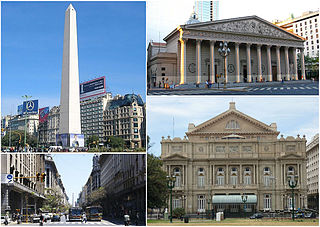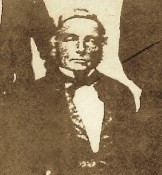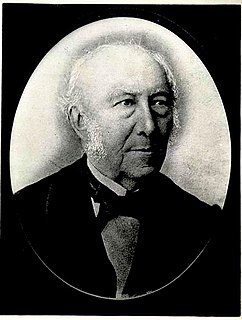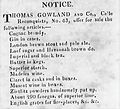
The British invasions of the River Plate were a series of unsuccessful British attempts to seize control of areas in the Spanish colonial Viceroyalty of the Río de la Plata that were located around the Río de la Plata in South America — in present-day Argentina and Uruguay. The invasions took place between 1806 and 1807, as part of the Napoleonic Wars, when Spain was an ally of Napoleonic France.

San Nicolás is one of the neighbourhoods of Buenos Aires, Argentina, sharing most of the city and national government Neighborhood of Buenos Aires with neighboring Montserrat and home to much of the financial sector. It's referred usually as El Centro, and the part east of the 9 de Julio Avenue is known as Microcentro.

The Generation of '80 was the governing elite in Argentina from 1880 to 1916. Members of the oligarchy of the provinces and the country's capital, they first joined the League of Governors, and then the National Autonomist Party, a fusion formed from the two dominating parties of the prior period, the Autonomist Party of Adolfo Alsina and the National Party of Nicolás Avellaneda. These two parties, along with Bartolomé Mitre's Nationalist Party, were the three branches into which the Unitarian Party had divided. In 1880, General Julio Argentino Roca, leader of the Conquest of the Desert and framer of the Generation and its model of government, launched his candidacy for President.

Manuel Mujica Láinez was an Argentine novelist, essayist and art critic.

Juan Larrea was a Spanish businessman and politician in Buenos Aires during the early nineteenth century. He headed a military unit during the second British invasion of the Río de la Plata, and worked at the Buenos Aires Cabildo. He took part in the ill-fated Mutiny of Álzaga. Larrea and Domingo Matheu were the only two Spanish-born members of the Primera Junta, the first national government of Argentina.
The May Revolution was a series of revolutionary political and social events that took place during the early nineteenth century in the city of Buenos Aires, capital of the Viceroyalty of the Río de la Plata, a colony of the Spanish Crown which at the time contained the present-day nations of Argentina, Bolivia, Paraguay and Uruguay. The consequence of the revolution was that the head of the Viceroyalty, Viceroy Cisneros, was ousted from office, and role of government was assumed by the Primera Junta. There are many reasons, both local and international, that promoted such developments.

Juan de Canaveris was an Piedmontese lawyer and politician, who served during the viceroyalty of Río de la Plata as accounting officer in the Tribunal de Cuentas de Buenos Aires. He had achieved a high social status in the Viceroyalty of the Río de la Plata, where he supported the revolutionary movements of May, being the only neighbor of Italian origin who attended in the Open Cabildo, of May 22, 1810.

Manuel Canaveris was an Argentine army officer, who took part in the defense and reconquest of Buenos Aires during the English Invasions. He served under Colonel Ignacio Álvarez Thomas in the 4th Regiment of Buenos Aires, participating in the Campaigns to the Interior of the Provinces of 1810.
Juan Miguel de Esparza was a Spanish military man and politician, who had a long career as a colonial official of the Viceroyalty of Peru, where he held the honorary positions of alcalde, regidor and procurador of Buenos Aires. He also served as lawyer, merchant, treasurer and Alférez real in charge of carrying the Royal Standard during the day of Saint Martin of Tours.
Juan José Canaveris (1780–1837) was an Argentine jurist and politician, who served as military man, lawyer, notary, prosecutor and accountant of Buenos Aires. In 1809 he was honored by the Junta Suprema de Sevilla, for his heroic participation in the defense of Buenos Aires, during the English invasions in the Río de la Plata.

Joaquín Canaveris was an Argentine attorney, merchant, politician and military man, who served as consignee in The Consulate of Buenos Aires. He had an active participation in the defense of Buenos Aires during the English invasions, serving as an Assistant in the battalion of Tercio de Vizcaínos.
Juan Manuel Canaveris (1804-1868) was an Argentine jurist and politician, who served in Buenos Aires and Montevideo as attorney, teacher and military man. He participated of the escort of honor in the funerals of Manuel Dorrego, and collaborated in the early days of government of Juan Manuel de Rosas.

Joseph Thwaites was an English trader who served as delegate in The British Commercial Rooms of Buenos Aires. He belonged to the group of British merchants, who had done business in Buenos Aires and Montevideo, between 1810 and 1830.
James Hodgson was a British merchant in the textile industry, co-founder of Hodgson, Robinson & Co. He maintained commercial ties with Buenos Aires in times of Juan Manuel de Rosas.
The British Packet, and Argentine News was an Anglo-Argentine weekly newspaper, edited for the British and American community of Buenos Aires. The journal was founded by Thomas George Love in 1826, and published until 1859.
Thomas George Love (1793-1845) was a British Agent and bookkeeper. He was founder of The British Packet, and Argentine News, and its editor from 1826 to 1845.

Daniel Gowland (1798–1883) was a British merchant and banker, who served as member of the board of directors of the Argentine Western Railway. He had an active participation in the commerce of Buenos Aires, toward 1856 he introduced from England La Porteña, the first locomotive train of the Argentina.

Thomas Gowland (1768–1833) was a British trader, who dedicated himself to the import and export of manufactured products in Buenos Aires. He was the patriarch of the Gowland family in the Rio de la Plata, established in the Buenos Aires neighborhood of San Nicolás at the beginning of the 19th century.
Johann Christian Zimmermann was a German businessman, politician and diplomat, who served as consul of the Hanseatic Cities of Bremen and Hamburg in Buenos Aires. He was one of the main merchants and importers of Argentina towards the first half of the 19th century.

Claudio Amoedo (1830–1871) was an Argentine medical doctor and politician. He served as president of the Medical Association of the Province of Buenos Aires during the government of Emilio de Castro y Rocha.















